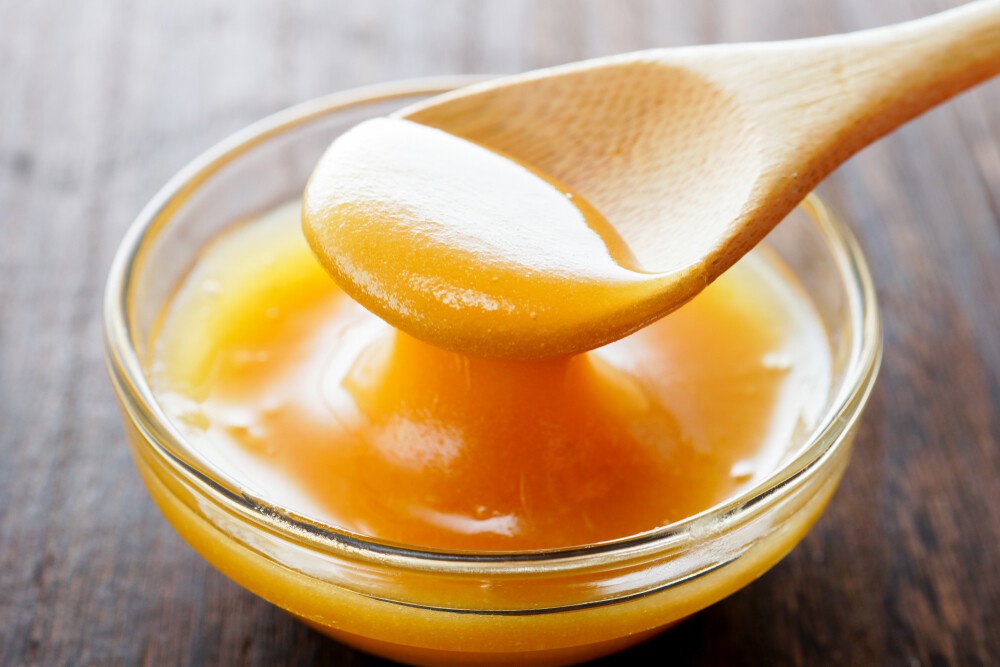Manuka Honey is a true miracle cure from nature: it helps with gastrointestinal complaints and colds, protects the teeth and helps fight fungi. We have compiled all the information about the natural all-rounder for you.
Sweet and still healthy: Manuka honey
Manuka honey is obtained from the flowers of the Manuka shrub (botanical name: Leptospermum scopqarium), a relative of the tea tree. The plant grows in New Zealand. It is therefore not surprising that Maori have centuries of experience with its use as a remedy. In the meantime, numerous studies have proven the medicinal effect of the amber-coloured honey with its intense taste.
Versatile remedy
The healing effect of honey has been known for a long time. However, Manuka Honey is the king of honeys as its healing properties far surpass those of any other sweet elixir. Thomas Henle, Professor of Food Chemistry at the TU Dresden, and his team found out why Manuka Honey is such a miracle cure: “That Manuka Honey has an antibacterial effect has been known for perhaps 30 years. What is actually responsible for this has not been known for many years. And we were able to show at the TU Dresden that a compound called methylglyoxal is responsible for this antibacterial effect.
The sugar degradation product MGO can combat bacteria in high doses and is already being traded as a natural alternative to antibiotics. Unlike antibiotics, experts have found that the bacteria do not become resistant to MGO. Unbelievable! That’s why a therapy with Manuka Honey can even make more sense than with antibiotics.
Manuka honey for colds
Treatment with Manuka Honey has proven to be particularly effective for colds. And everyone of us has to fight with these a few times in the course of our lives. If the immune system is weakened, the antibiotic-resistant bacterium Staphylococcus aureus can multiply wonderfully in the body. The culprit is responsible for numerous diseases such as sinusitis, bronchitis and pneumonia. But with the help of Manuka Honey, you can fight these stubborn bacteria. In a sweet way.
Manuka honey against gastrointestinal diseases
Manuka Honey therapy can also be very effective for gastrointestinal problems, as nasty bacteria can also cause problems there. Echerichia coli and Helicobacter pylori, which very often cause complaints, like to romp about in the gastrointestinal tract. Manuka honey can slow down the growth of the bacteria.
Manuka honey against fungi
But Manuka Honey is not only a bacteria killer. The sweet remedy also helps to fight fungal infections. Fungal infections such as athlete’s foot and even lichens can be treated naturally with the honey.
Manuka honey for beautiful teeth
Actually, the sugary honey is considered to be caries-promoting. Manuka honey is the exception, because it contributes to a healthy oral flora: It eliminates germs and inhibits the formation of plaque. Finally, you can eat uninhibitedly and do something good for the little bites.
Taking Manuka Honey
The applications of Manuka Honey vary according to the area of action. Those who wish to strengthen their immune system can stir the honey into their tea or coffee in the morning as the active ingredient MGO is heat resistant. For colds you can dissolve a teaspoon of the honey in your mouth three times a day. For sinus diseases you can additionally rub some honey on the inner nasal walls before going to bed. For sore throats, sweets with Manuka Honey have proven to be particularly effective. For gastrointestinal disorders, take a teaspoon of honey on an empty stomach. The interval between meals should be at least one hour. You should not drink any liquid immediately after taking the honey.
MGO content
As with all natural products, the content of active ingredients in Manuka Honey varies. Since a healing effect can only be said to exist if the MGO content exceeds 100 mg, you should pay attention to the MGO content when buying the honey. The content of the active ingredient can be up to 500 mg. Above 400 mg MGO is considered to be of excellent quality.
Price of manuka honey
Excellent quality naturally has its price: a glass of this all-rounder can cost up to 80 USD. But to try out this wonder weapon against bacteria and fungi, there are also smaller bottles that cost around 10 to 20 USD. To get a high quality product, you should buy the honey in organic shops or health food shops.

